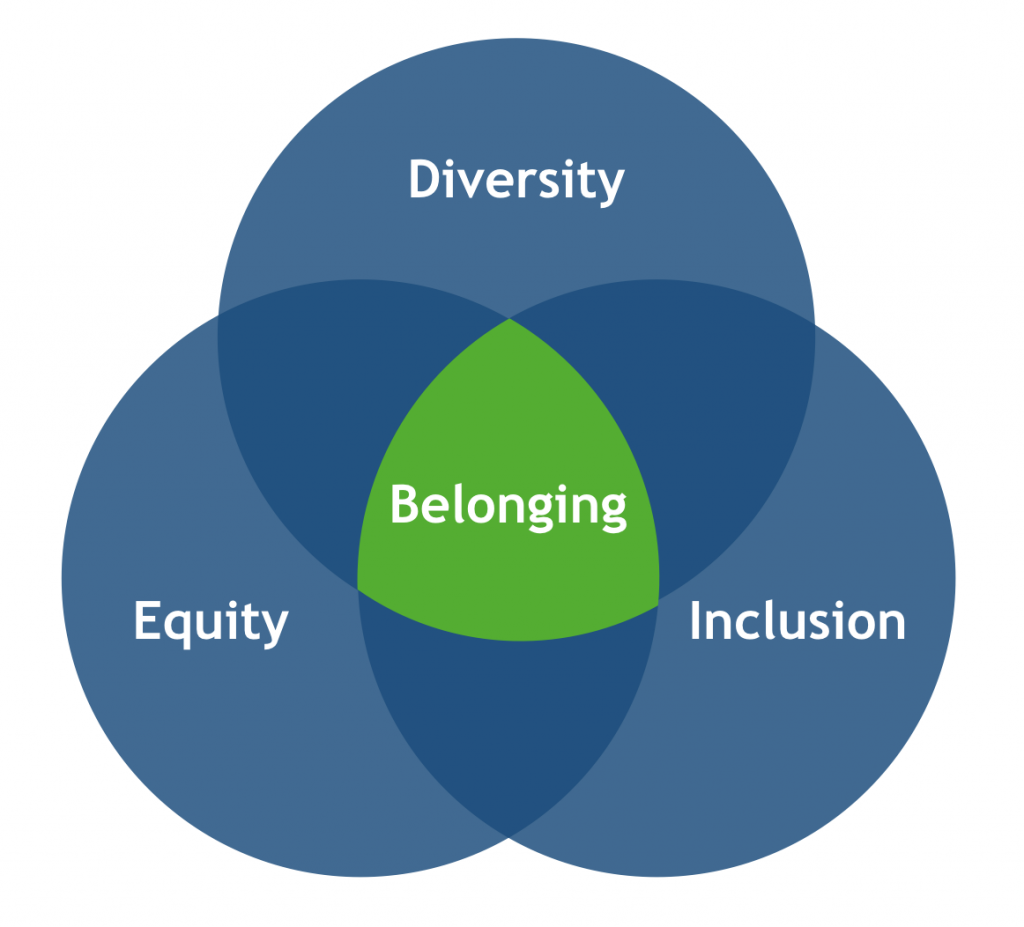
Organizations thrive when people thrive. And people thrive when the workplace they are in shows a true commitment to employee diversity, equity, inclusion, and belonging (DEIB).
Diversity, equity, inclusion, and belonging have become significant aspects of our everyday lives and substantial in working environments. In the workplace, individuals’ characteristics and abilities help in the growth and success of an organization.
Therefore, is essential to encourage and support diverse viewpoints and ensure that everyone is part of the organization. As a results, it gives a sense of belonging to all members.
A DEIB-focused workplace ensure that all employees feel heard and recognized, effectively contributing to the organization’s growth through increased productivity. Creating a culture where employees feel they belong makes an organization more attractive to the best talent, helps meet business goals, and creates positive employee experiences.
DEIB = Diversity-Equity-Inclusion-Belonging

Diversity
Diversity in the workplace entails both an individual’s invisible and visible characteristics. It refers to organizations that intentionally employ people with different features, including gender, age, sexuality, and religion.
It also entails people with varying levels of education, experiences, classes, and skills. Diversity ascertains that the different employees bring different perspectives, viewpoints, and backgrounds to the table.
Equity
Equity in the workplace ascertains that each individual has equal access to resources and opportunities among the staff. Identifying and evaluating any current barriers to equitable access to opportunities and resources is a necessary step to learn where they might exist and how to remove them.
It is essential to recognize that not every individual comes from a similar background. Each individual should have access to the same resources and opportunities that ensure their growth and development despite their identity and characteristics. For instance, an organization can achieve equity by compensating employees fairly and treating them equally without discrimination.
Inclusion
Inclusion in the workplace involves creating and achieving a work environment where all individuals are treated fairly and respected. It also includes providing access to opportunities and resources that contribute to both, their own growth and organizational success; so, ensuring that each employee’s opinions and voices are heard and considered is important in creating an inclusive workplace. Inclusion means that all company members are included, recognized in its operations and enables them to be successful within the organization.
Belonging
In Maslow’s hierarchy of needs, the basic requirements for an individual include physiological needs such as food and shelter. After these needs are met, people tend to fulfill their safety needs, including employment, financial security, health, and personal security.
Followed by love and belonging and self-actualization consequently lead to personal fulfillment. In the workplace, belonging is essential for any employee and drives an individual’s behavior. It invokes feelings of connection through valuable workplace relationships, motivating work, and creating a culture of belonging.

Why DEIB? The benefits
People seek authenticity and inclusive leadership. And implementing DEIB in the workplace have had various benefits that contribute to the well-being and growth of the organization. And here are just some of them:
Attract a bigger talent pool
Diversity in the workplace allows access to diverse people with different qualifications, experiences, and skills. A diverse organization has access to a vast pool of candidates who meet its recruitment and hiring needs. It is vital in attracting qualified and diverse interested applicants.
Increased employee engagement
When employees feel included, they are more engaged in the workplace. Highly engaged employees feel part of the organization and are more willing to contribute to its success. High employee engagement ensures that employees are motivated, which leads to increased productivity and employee retention. The employees can also contribute significantly to the mission of the organization by sharing their opinions and identifying changes that need to be made.
Foster innovation
Inclusion and diversity lead to innovation in the workplace. Diverse groups bring diverse and fresh ideas; and this is where the innovation starts. Diverse teams can innovate on products and services that meet the needs of various customers. Access to different expertise provides sources of innovation, which is essential for an organization to remain relevant and meet the needs of its consumers.
Increased productivity
Equity and belonging in the workplace ensure improved productivity and higher performance. When the employees feel safe, respected, connected, and they feel they belong to a community, they are more engaged into day-to-day activities. As a result, they actively boost organizational-wide productivity.
Higher employee retention
DEIB contributes to job satisfaction which is essential in the retention of employees. In conclusion, diversity, equity, inclusion, and belonging are necessary for any organization as increased productivity, profits, employee performance, and high employee retention ensure the growth and success of the organization.
Best practices on how to start
Building a strong diversity, equitable, inclusive, and belonging environment is essential. But it takes intentionality to implement it. Using strategies that recognize DEIB initiatives are critical in transforming the organization.
Communicate On DEIB initiatives
To get started, as an organization you have to be clear about your intentions. Addressing and communicating why DEIB is significant for all employees and why this is imperative in ensuring organizational long-term success. And this starts with the leadership team itself.
When business owners and leaders take a stand and speak out on DEIB, the employees are likely to emulate and create meaningful change. Effective communication will ensure that each member is aware of the changes and will prompt the adaptability of the DEIB.
Evaluate your current workplace environment
You don’t know what to change if you don’t asses where you are. Organizations should evaluate the current workplace environment. It is important to consider whether the employees feel heard.
Identify gaps in the existing processes (such as performance and people development) and determine equal access to opportunities and resources. Furthermore, identifying and gathering insights on the employees’ experiences allows spotting the gaps and creating action plans.
The easiest way to understand the level of inclusion among employees from underrepresented groups of people look is to ask questions and analyze engagement data. Data will show you positive and negative trends, and allows you to make correlations and take data-driven decisions.
Develop a DEIB plan and measure success
DEIB requires intentionality and ongoing practice. A workplace assessment on DEIB is not enough. With the information gathered, you can analyze the data and use the insights to develop a DEIB plan that addresses the critical gaps and needs. This is how you will create an effective DEIB strategy and ways to implement it.
Lastly, once implemented, measuring the success is a must as well. So, focus on developing some key measures to evaluate the progress and then address those areas that need adjustments going forward.








